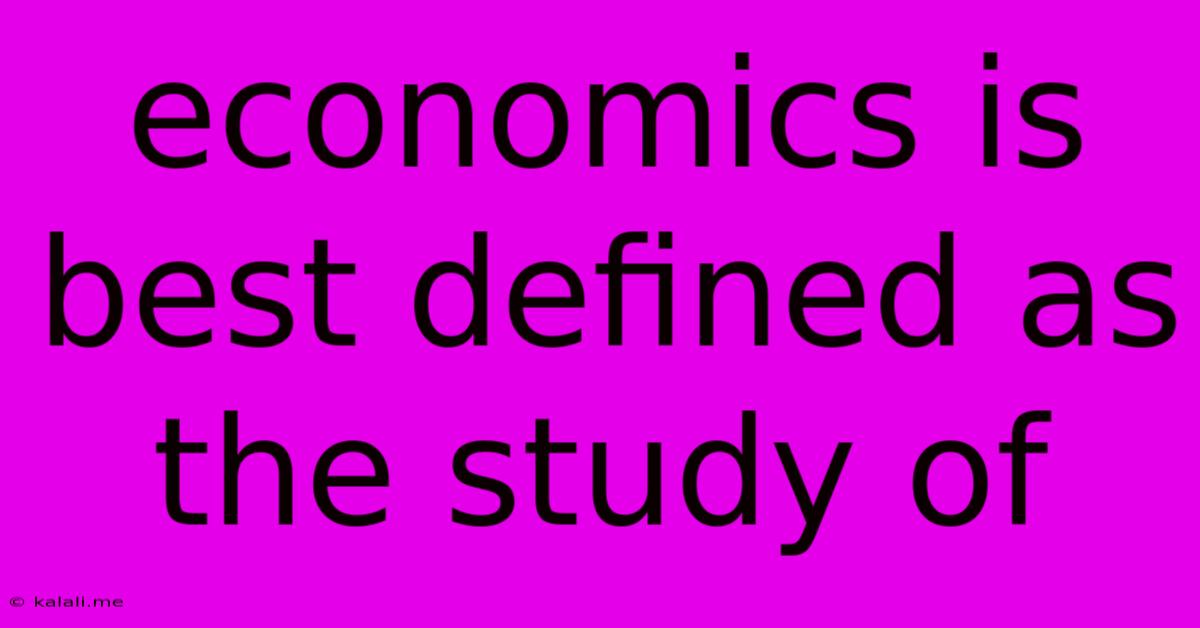Economics Is Best Defined As The Study Of
Kalali
Jun 12, 2025 · 3 min read

Table of Contents
Economics is Best Defined as the Study of Scarcity and Choice
Economics is a vast and complex field, but at its core, it's best defined as the study of how societies allocate scarce resources to satisfy unlimited wants and needs. This fundamental definition highlights two key concepts: scarcity and choice. Understanding these concepts is crucial to grasping the essence of economic principles. This article will delve into the intricacies of this definition, exploring its various facets and implications.
What is Scarcity?
Scarcity doesn't mean there's a complete lack of something. Instead, it refers to the limited availability of resources relative to unlimited human desires. These resources can be anything from natural resources like land and minerals to human capital (labor and skills) and manufactured goods. The reality is that we simply don't have enough resources to produce everything everyone wants. This fundamental constraint shapes every economic decision.
The Inevitable Role of Choice
Because resources are scarce, choices must be made. Individuals, businesses, and governments constantly face trade-offs. Choosing to spend money on one thing means foregoing another. A company deciding to invest in new technology might have to delay expanding its workforce. Governments have to prioritize spending on healthcare, education, or infrastructure, knowing that a choice in one area limits investment in others. This process of weighing costs and benefits is at the heart of economic analysis.
Microeconomics vs. Macroeconomics: Two Sides of the Same Coin
The study of economics is often divided into two main branches:
-
Microeconomics: This branch focuses on the behavior of individual economic agents, such as consumers, firms, and markets. It examines topics like supply and demand, market structures, pricing strategies, and consumer choice theory. Microeconomics helps us understand how individual decisions contribute to broader economic trends. Examples include analyzing the impact of a minimum wage increase on employment in a specific industry or studying how a new technology affects the pricing of a particular product.
-
Macroeconomics: This branch looks at the economy as a whole. It analyzes aggregate economic indicators such as national income, inflation, unemployment, economic growth, and government policy. Macroeconomics helps us understand the forces that drive overall economic performance and the impact of government policies on those forces. Examples include examining the effect of interest rate changes on national investment or studying the causes and consequences of a recession.
Beyond the Basics: Expanding the Definition
While scarcity and choice form the core of economics, the discipline also encompasses other crucial aspects:
-
Production and Distribution: Economics explores how goods and services are produced and distributed within a society. This involves analyzing production processes, factors of production (land, labor, capital, entrepreneurship), and the various mechanisms for distributing goods and services, such as markets, governments, and charities.
-
Economic Systems: Economics examines different economic systems, such as capitalism, socialism, and mixed economies. It analyzes the strengths and weaknesses of each system and how they influence resource allocation, production, and distribution.
-
Economic Growth and Development: Economics investigates the factors that drive economic growth and development, both domestically and internationally. This includes studying issues like technological progress, human capital development, international trade, and sustainable development.
Conclusion:
In conclusion, economics is best defined as the study of how societies manage scarce resources to satisfy unlimited wants and needs. This necessitates making choices, leading to the core concepts of scarcity and choice. By understanding these principles, and exploring the various branches of economics, we can gain valuable insights into how economies function, how to make better decisions, and how to address important economic challenges. From individual choices to global trends, economics offers a framework for understanding the complexities of our world.
Latest Posts
Latest Posts
-
Which Test Is Not A Projective Test
Jun 13, 2025
-
Which Of The Following Is An Open Ended Question
Jun 13, 2025
-
Which Of The Following Are Not Units Of Pressure
Jun 13, 2025
-
What Is The Antonym For Hostile
Jun 13, 2025
-
Density Of Water At 4 Deg C
Jun 13, 2025
Related Post
Thank you for visiting our website which covers about Economics Is Best Defined As The Study Of . We hope the information provided has been useful to you. Feel free to contact us if you have any questions or need further assistance. See you next time and don't miss to bookmark.